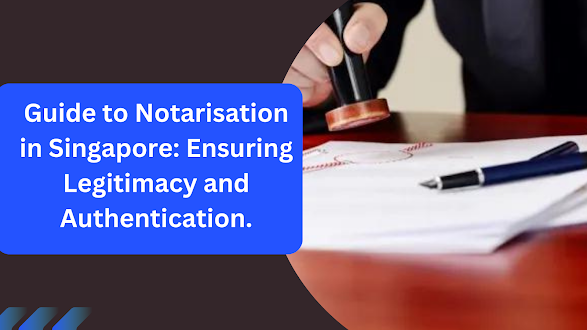Guide to Notarisation in Singapore: Ensuring Legitimacy and Authentication.
In the intricate landscape of legal documentation, notarisation stands as a crucial process that verifies the
authenticity and legitimacy of important documents.
In Singapore, a global financial hub and center of commerce,
notarisation plays a pivotal role in establishing the credibility of various
legal instruments. This comprehensive guide to notarisation in Singapore delves
into the intricacies of the process, its significance, and the steps involved
ensuring that documents hold legal weight and are recognized both locally and
internationally.
Understanding Notarisation:
Notarisation is the act of having a qualified legal professional, known
as a notary public, authenticate and verify the contents of a document. Notaries public are appointed by the
Singapore Academy of Law and are authorized to attest to the authenticity of
signatures, the truth of statements, and the accuracy of documents. This
process provides an additional layer of credibility and authenticity, making
documents suitable for official use within Singapore and beyond its borders.
Key Documents Requiring
Notarisation:
Various legal documents necessitate notarisation to be deemed legally
valid and recognized. These documents include but are not limited to:
Affidavits: Sworn written
statements made under oath or affirmation.
Powers of Attorney:
Documents authorizing a person to act on behalf of another in legal matters.
Deeds: Written agreements or
contracts between parties.
Statutory Declarations:
Formal statements of facts that are signed in the presence of a notary public.
Certificates of Incumbency: Documents
certifying the identity and authority of directors and officers of
corporations.
The Notarisation Process:
Document Preparation: Ensure
the document is properly drafted and contains accurate information. It's
advisable to seek legal counsel if needed.
Engage a Notary Public:
Choose a qualified notary public recognized by the Singapore Academy of Law. Schedule an appointment with the notary
to have the document notarised.
Verification and Witnessing:
During the appointment, the notary
public will verify your identity and the authenticity of the document. You
may be required to provide supporting identification documents.
Oath or Affirmation:
Depending on the document, you might need to swear an oath or make an
affirmation before the notary public.
Notarial Certificate: The notary public will affix their seal and
signature to the document, along with a notarial certificate that attests to
the notarisation.
Notary Seal and Signature:
The seal and signature of the notary public signify the document's authenticity
and the notary's status.
Benefits of Notarisation:
Notarised documents hold several advantages, including:
International Recognition: Notarised documents are recognized
internationally, facilitating cross-border transactions and legal proceedings.
Legal Validity: Notarisation
enhances the legal validity of documents, protecting parties involved from
potential disputes.
Credibility: Notarised
documents carry a higher level of credibility due to the involvement of a
qualified legal professional.
Avoiding Fraud: The
notarisation process helps prevent fraudulent activities by verifying the
identity of signatories and the accuracy of information.
Conclusion:
In the legal realm, notarisation
in Singapore stands as a critical step to ensure the legitimacy and
authenticity of documents. It plays a vital role in facilitating business
transactions, legal proceedings, and various other activities that require
verified documentation. Understanding the process and significance of
notarisation empowers individuals and businesses to navigate the complexities
of legal documentation with confidence, safeguarding their interests and
ensuring the proper execution of their agreements.



Comments
Post a Comment